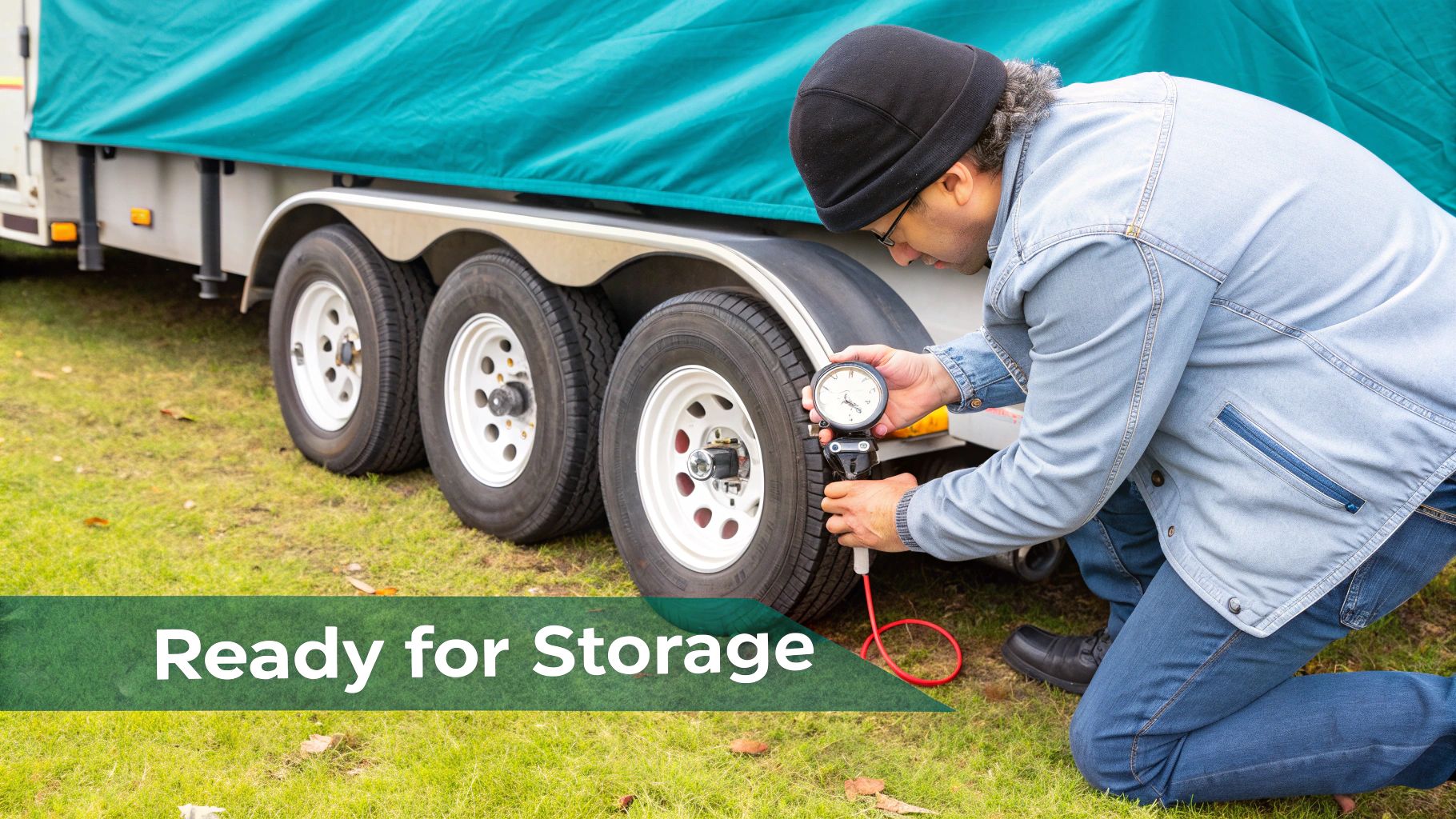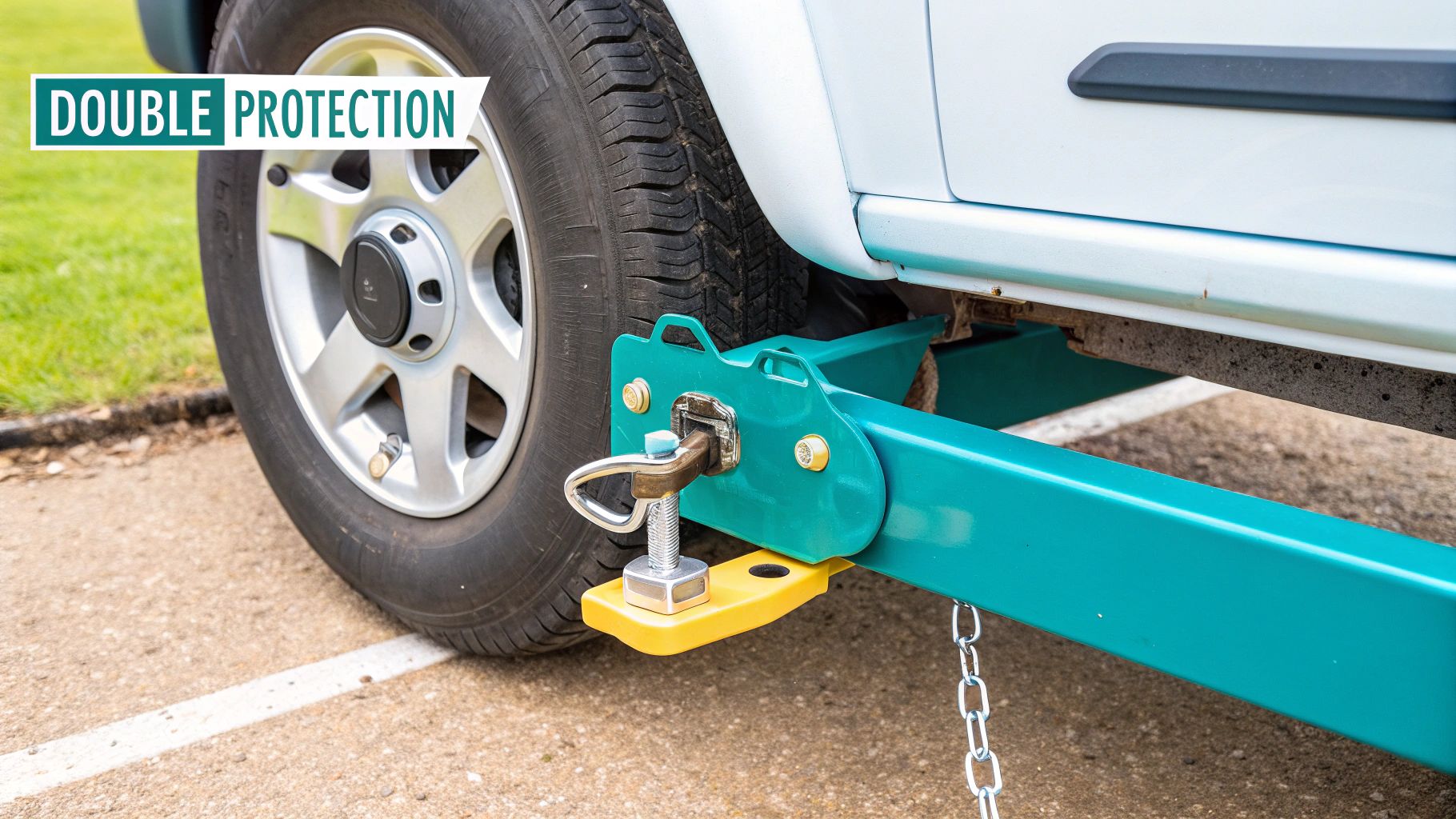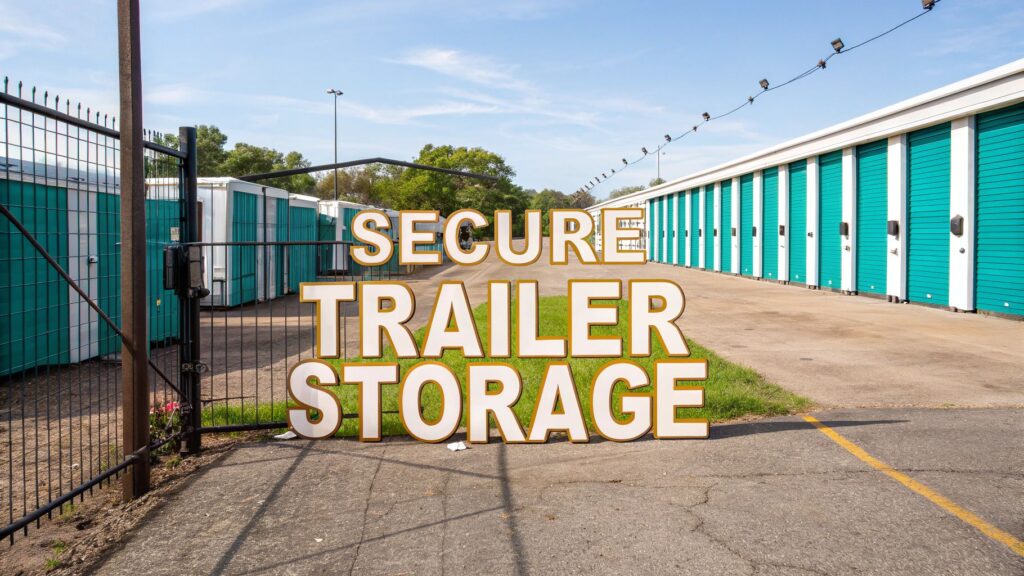Finding a safe, convenient place to park your trailer can be a real headache. Whether it's a work trailer taking up precious driveway space, a caravan you only use for holidays, or part of a commercial fleet, the challenges are always the same: limited space, theft risk, and council restrictions. These are constant worries for owners right across the UK.
Why Finding Secure Trailer Storage Matters
Let's face it, parking a trailer at home isn't always practical or secure. Many residential areas have specific rules limiting where and for how long you can keep one, which can turn your own property into a source of stress. And it’s not just about regulations; leaving a valuable asset on the street or even in your drive makes it an easy target for theft and vandalism.
This is where professional storage for trailers comes in. It’s not just about finding an empty plot of land; it’s about securing peace of mind. A dedicated facility offers a controlled environment designed to protect your investment from both criminals and the unpredictable British weather.
The Growing Need for Off-Site Storage
The demand for secure parking is definitely on the rise. The UK’s trailer fleet has grown significantly, mirroring a wider European trend, which means more trailers need a home when they're not in use. This, combined with market conditions encouraging owners to hold onto their trailers longer, has created a kind of 'trailer hoarding' effect, with idle trailers waiting for future transport jobs.
This situation really highlights the growing need for organised, secure storage facilities to manage parked fleets and keep logistics running smoothly. You can dig deeper into these transport industry trends in the full European outlook report.
The graphic below sums up the key challenges that make secure storage a must-have for UK trailer owners.

These figures paint a clear picture. Trailer owners are juggling a mix of practical and security-related problems that off-site storage directly solves.
Key Takeaway: Professional storage for trailers isn't a luxury; it's an essential service that solves the real-world problems of security, space, and compliance that many owners face daily. It lets you reclaim your personal space while ensuring your valuable asset is properly protected.
Choosing the Right Trailer Storage Facility
Not all storage sites are created equal, and when you’re looking for a spot for your trailer, it’s about more than just the price tag. The best facilities strike a perfect balance between top-notch security, easy access, and a fair cost, giving you real value and, more importantly, peace of mind. A cheap option might look good on paper, but it could leave your valuable asset exposed.
First things first, let's talk security features. You’ll want to see multi-layered protection. Think 24/7 monitored CCTV, solid perimeter fencing, and controlled, gated access that only lets authorised people in. Having staff on-site during business hours is another huge plus—it adds a human touch and an extra pair of eyes on your trailer.

Next, think about your own schedule. How and when will you need to get to your trailer? Some places offer round-the-clock access, which is brilliant for tradespeople needing an early start or weekend adventurers getting back late. Others have set opening times, which might be perfectly fine if you have a more predictable routine.
Location and Practicalities
The facility’s location is a massive factor. A site further out might seem cheaper, but don’t forget to weigh up the travel time and fuel costs. A conveniently located facility saves you a headache every single time you need to pick up or drop off your trailer. This is a lot like choosing a spot when you're moving house, which we cover in our guide on how to choose the best storage facility when moving house.
The self-storage industry in the UK, including specialised storage for trailers, is booming. It's projected to grow at a Compound Annual Growth Rate of about 5.9% between 2024 and 2034. This growth means more choices for you, especially in expanding areas like the South East and North West. So, it really does pay to look around for a facility that ticks all your boxes.
Pro Tip: Before you sign anything, go and visit your top choices in person. You'll get a much better feel for the place than you ever could from photos. Check out the cleanliness, how organised the site is, and get a real sense of the overall security.
Lastly, have a look at customer reviews and ask about their insurance requirements. A reputable company will have plenty of positive feedback and will be completely upfront about what their liability covers and what you'll need to arrange yourself. Making a smart, informed decision now will save you from a lot of potential stress down the line.
To help you out, we've put together a quick checklist to guide your decision-making process.
Your Trailer Storage Facility Checklist
Use this quick reference table to evaluate different facilities and make sure you're choosing the best spot to keep your trailer safe and sound.
| Feature | What to Look For | Why It Matters |
|---|---|---|
| Security | 24/7 CCTV, secure fencing, gated access, on-site staff. | Provides multiple layers of protection against theft or damage. |
| Access | Opening hours that match your schedule (ideally 24/7). | Ensures you can get to your trailer whenever you need to. |
| Location | Close to your home or main routes, easy to get to. | Saves you time, fuel, and hassle on every trip. |
| Reviews & Reputation | Positive online reviews and good word-of-mouth. | Indicates reliable service and a trustworthy operator. |
| Insurance | Clear policies on what’s covered and what you need. | Protects you financially in case of unforeseen events. |
| Condition | Clean, well-maintained, and organised site. | Shows the provider cares about their facility and your property. |
Taking a moment to run through these points for each facility you consider will give you the confidence that you're making the right choice for your trailer.
How to Prepare Your Trailer for Storage
Let's be honest, just parking your trailer, locking it up, and walking away is a recipe for some expensive problems down the line. A bit of prep work is crucial if you want to keep it in good nick, ensuring it’s ready to roll the moment you need it again. Taking the time to properly prepare your equipment before putting it into storage for trailers protects it from damage, prevents costly repairs, and ultimately maintains its value.
A well-prepped trailer is also a much safer trailer. Things like tyre degradation, rust, or seized parts can easily develop over time if left unchecked. A few proactive steps now will save you from discovering a major problem when you're already on a tight schedule.

Essential Pre-Storage Checks
Before you lock it up, a quick run-through of a simple checklist will make sure you haven't missed anything important. Trust me, these small tasks make all the difference.
First things first, give it a thorough clean, inside and out. Getting rid of any dirt, grime, or leftover bits and pieces is your best defence against mould, mildew, and unwanted pests. A clean, empty trailer is a happy trailer. If you're not sure how much space you'll need for the items you've taken out, our handy storage calculator can give you a quick estimate.
With that done, it's time to focus on the mechanics:
- Tyres: Check the pressure and inflate them to the manufacturer's recommended level. This simple job helps prevent flat spots from developing, which can completely ruin a perfectly good set of tyres.
- Battery: Disconnect the battery terminals. This stops it from slowly draining over time, so you can avoid the annoying surprise of a dead battery when you come back.
- Lubrication: Apply grease to all the moving parts—think hitch mechanism, jacks, and suspension components. This is your best bet for warding off rust and ensuring everything moves smoothly when you retrieve your trailer.
Key Takeaway: A few hours spent on preparation can save you hundreds of pounds in repairs. Think of it as an investment in your trailer's future health and reliability.
Finally, consider getting a high-quality, breathable cover. It’s the best way to shield your trailer from dust, debris, and the famously unpredictable British weather, keeping its finish in top condition while it waits for its next adventure.
Boosting Your Trailer's On-Site Security
While a secure storage facility like ours provides a fantastic first line of defence, adding your own security measures creates a crucial second layer of protection. Think of it as a team effort: we secure the perimeter, and you secure the asset itself. This dual approach is always the most effective way to deter thieves, especially if you're looking at long-term storage for trailers.
Even in the most secure yards, a few of your own physical deterrents will make your trailer a much less appealing target. Opportunistic thieves will almost always go for the easiest option they can find. A trailer kitted out with high-quality locks sends a clear signal for them to move on and find an easier mark. The visual impact of a hefty lock can be just as powerful as its actual strength.

Essential Security Devices
Investing in the right hardware is non-negotiable. It's a relatively small outlay for a significant boost in security, much like the peace of mind you get from secure car storage.
Here are the most effective bits of kit to consider:
- High-Security Hitch Locks: These devices clamp right over the hitch coupling, making it impossible for a thief to attach your trailer to their vehicle and drive off.
- Robust Wheel Clamps: A highly visible and effective deterrent. A good quality wheel clamp physically stops the wheel from rotating, making a quick getaway impossible.
- Heavy-Duty Padlocks: Don't overlook the basics. Use a formidable padlock on any toolboxes or storage compartments you have on the trailer itself.
Beyond physical locks, technology gives you another powerful layer of security. A discreet GPS tracking device can be a real game-changer. If the worst should happen, a tracker dramatically increases the chances of getting your trailer back by giving the police real-time location data.
Simple admin is just as important as the hardware. Always take photos of your trailer from every angle and keep a clear record of its serial number and any unique marks or features. This documentation is invaluable for police reports and insurance claims.
The demand for secure trailer parking is definitely on the rise, partly due to less space in urban areas and more businesses running commercial fleets. This trend is fuelling a boom in self-storage development across the UK, with projections showing the number of new facilities rising from 70 in 2024 to an expected 82 by 2026.
Getting the Paperwork Right: Insurance and Legal Essentials
Sorting out the paperwork is a non-negotiable step when you arrange storage for trailers off-site. It’s easy to gloss over the small print, but getting a handle on the insurance and legal details from the start is the best way to protect yourself from any nasty surprises down the line.
First things first, you absolutely must let your insurance provider know about your new storage plans. A lot of policies have specific clauses about where a trailer is kept overnight, and if you don’t tell them, you could find your cover is completely invalid. It’s worth a quick call to ask them directly if your current policy gives you enough protection against theft or damage while it’s parked up at a secure facility.
Understanding Your Cover and Their Liability
Reputable storage facilities like ours have their own liability insurance, but it’s vital to understand what this actually covers. In short, it protects the facility against negligence on their part—say, if damage is caused by their staff or a piece of faulty equipment.
What it does not usually cover is your trailer or its contents against things like theft, fire, or flooding.
Crucial Takeaway: The facility's insurance protects them, not you. It is almost always a contractual requirement for you to have your own insurance in place for your trailer and its contents for the full duration of the storage period.
This is exactly why having all your documents in order is so important. Make sure you have proof of ownership, like a bill of sale or registration document, filed away somewhere safe.
It's also a great idea to keep a detailed inventory, especially if you’re storing tools or valuable equipment inside the trailer. A few clear photos of the trailer and any high-value items can be invaluable if you ever need to make an insurance claim.
Finally, take the time to read your storage agreement properly before you sign anything. Pay close attention to the clauses covering liability, access rights, and how to end the agreement. This contract spells out your responsibilities and the facility’s obligations, making sure there are no misunderstandings and that your valuable asset is fully protected.
Common Questions About Trailer Storage
When you're looking into professional storage for trailers, it's only natural to have a few questions buzzing around. Getting straight, clear answers is the key to feeling confident in your choice, so let's tackle some of the most common queries we hear from trailer owners.
Figuring out the costs is usually top of the list. Here in the UK, prices can be a bit of a moving target, depending on things like your trailer's size, where the facility is, and the level of security on offer. A prime spot in a city centre is naturally going to cost more than one out in a more rural area.
What's the Typical Cost for Trailer Storage?
For a standard trailer, you can expect the monthly cost to be somewhere in the range of £40 to over £100. If you've got a larger commercial trailer or one that needs special access, you'll be looking at the higher end of that scale. A small utility trailer, on the other hand, will be much more budget-friendly. Your best bet is always to get a specific quote based on your trailer’s exact dimensions.
It helps to think of storage as an investment in keeping your trailer safe and in good nick. The price often reflects the quality of protection you're getting, from 24/7 CCTV to having staff on-site. That small monthly fee can prevent much bigger headaches like theft or damage down the line.
Insurance and Access Explained
Another question we get all the time is about insurance. While any good facility will have its own liability insurance, it's important to realise this doesn't cover your property. You are responsible for insuring your own trailer and whatever you're keeping in it. In fact, most storage agreements will require you to have a valid policy in place—it’s a simple step that protects both you and the facility.
As for getting to your trailer, this can really vary from one site to another.
- 24/7 Access: Loads of modern facilities now offer round-the-clock access with a secure keypad. This is a game-changer for tradespeople or anyone working unpredictable hours.
- Set Hours: Some places operate with fixed opening times, maybe 7 am to 11 pm. This is often more than enough for most people and can sometimes be a slightly cheaper option.
Finally, people often ask about the minimum rental period. Most facilities, including ours, work on flexible month-to-month contracts. This gives you the freedom to store your trailer for as long as you need without getting tied into a long commitment. That said, some providers might offer a bit of a discount for longer-term deals, so it's always worth asking if you know you'll be storing it for a while.
Ready to secure your spot? At Shield Self Storage, we provide safe, accessible, and affordable storage for trailers in The Wirral. Get your free quote today and find the perfect solution for your needs.



